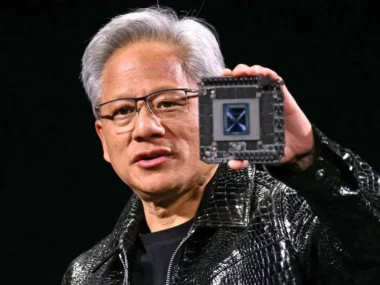Alibaba Group’s recently appointed CEO is fully committed to integrating artificial intelligence (AI) into the company’s operations and promoting younger individuals to senior management roles. This comes as Alibaba embarks on its most extensive restructuring effort to date.
Eddie Wu, who assumed the role of chief executive on Sunday, succeeded Daniel Zhang, becoming Alibaba’s fourth CEO in its 24-year history. He also took charge of the cloud division following Zhang’s unexpected departure from that unit.
In a memo circulated on Tuesday, Wu outlined his long-term vision for the company, which involves identifying new avenues for growth in a challenging economic landscape and amidst rising competition from rivals.
He emphasized two primary strategic priorities for Alibaba: “User First” and “AI-driven.” Wu expressed the need to realign the company’s operations around these core strategies and reshape its business priorities accordingly.
Wu also highlighted the profound impact he expects AI to have across all sectors in the coming decade. He warned that failing to keep pace with the changes brought about by the AI era could lead to Alibaba losing its competitive position, underlining the importance of adapting to these disruptions.
The disclosure of the company’s strategy aligns with its significant restructuring efforts, which mark the most extensive in its history.
As per a plan unveiled in March, Alibaba is set to divide itself into six distinct units encompassing cloud, e-commerce, logistics, media, and entertainment. Each unit will have its own CEO and board of directors, and many of them will have the opportunity to pursue individual listings or fundraising activities.
Furthermore, the business landscape has become increasingly challenging for one of China’s most valuable internet companies.
China’s economy is experiencing a slowdown, with consumers exhibiting caution in their spending habits. This has placed e-commerce firms like Alibaba in a position where they must provide greater discounts on their products to attract customers.
In addition to economic challenges, Alibaba is also contending with heightened competition from prominent online adversaries, such as Pinduoduo (PDD), and Douyin, which is owned by Bytedance. Douyin, known for its short video platform, has a robust live shopping component that poses a substantial competitive threat.
Wu pointed out that Alibaba has experienced rapid growth in its 24-year history by capitalizing on the trends in internet technology. However, he acknowledges that the company needs to undergo a transformation to unlock the path to future success. Traditional internet models are becoming increasingly similar, and new technologies like AI are emerging as the driving force behind global business growth.
In line with this transformation, Alibaba intends to rejuvenate its leadership team by promoting individuals born after 1985 to become the core of its business management team within the next four years.
The company will also strengthen its strategic investments in three key areas: technology-driven internet platforms, AI-powered tech ventures, and global commerce networks. Additionally, Alibaba will adopt a more open and collaborative approach, even with companies that were traditionally considered competitors.
This shift toward AI is a trend seen among major tech firms globally, including Google, Amazon, and Microsoft, especially following the remarkable impact of ChatGPT late last year.











